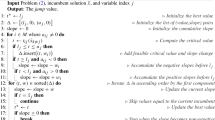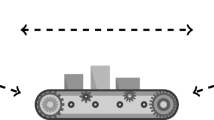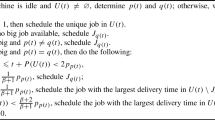Abstract
In generalized malleable scheduling, jobs can be allocated and processed simultaneously on multiple machines so as to reduce the overall makespan of the schedule. The required processing time for each job is determined by the joint processing speed of the allocated machines. We study the case that processing speeds are job-dependent \(M ^{\natural }\)-concave functions and provide a constant-factor approximation for this setting, significantly expanding the realm of functions for which such an approximation is possible. Further, we explore the connection between malleable scheduling and the problem of fairly allocating items to a set of agents with distinct utility functions, devising a black-box reduction that allows to obtain resource-augmented approximation algorithms for the latter.
Similar content being viewed by others
Notes
Note that for the classic (non-malleable) makespan minimization problem, Assignment and Scheduling are in fact identical, as processing jobs in arbitrary order on their assigned machine turns any assignment \({\textbf{S}}\) into a schedule whose makespan equals the \(L({\textbf{S}})\). This equivalence, however, does not hold for the malleable case [10].
For an illustrative example of this setting, consider harvesting operations in agriculture industry [32], with the machines representing employees with different skill sets. Jobs represent operations such as harvesting a field or straw baling, the slots represent different specialized tools/machinery available for those operations (e.g., a wheat field can be harvested using one or several combine harvesters of different size, possibly aided by tractors with trailers), and the weights reflect the different skill levels of the employees for operating a particular type of machinery. A matroid constraint prevents the simultaneous use of certain machinery (e.g., for safety reasons or space constraints).
References
Bampis, E., Dogeas, K., Kononov, A., Lucarelli, G., Pascual, F.: Scheduling malleable jobs under topological constraints. In: 2020 IEEE International Parallel and Distributed Processing Symposium (IPDPS). pp. 316–325. IEEE (2020)
Bansal, N., Sviridenko, M.: The Santa Claus problem. In: Proceedings of the Thirty-Eighth Annual ACM Symposium on Theory of Computing. pp. 31–40 (2006)
Bartolini, E., Dell’Amico, M., Iori, M.: Scheduling cleaning activities on trains by minimizing idle times. J. Sched. 20(5), 493–506 (2017)
Blazewicz, J., Cheng, T.E., Machowiak, M., Oguz, C.: Berth and quay crane allocation: a moldable task scheduling model. J. Oper. Res. Soc. 62(7), 1189–1197 (2011)
Bleuse, R., Hunold, S., Kedad-Sidhoum, S., Monna, F., Mounié, G., Trystram, D.: Scheduling independent moldable tasks on multi-cores with GPUs. IEEE Trans. Parallel Distrib. Syst. 28(9), 2689–2702 (2017)
Chen, X., Li, M.: \(M^\natural \)-Convexity and Its Applications in Operations. Operations Research (2021)
Correa, J., Marchetti-Spaccamela, A., Matuschke, J., Stougie, L., Svensson, O., Verdugo, V., Verschae, J.: Strong LP formulations for scheduling splittable jobs on unrelated machines. Math. Program. 154(1), 305–328 (2015)
Du, J., Leung, J.Y.T.: Complexity of scheduling parallel task systems. SIAM J. Discret. Math. 2(4), 473–487 (1989)
Fotakis, D., Matuschke, J., Papadigenopoulos, O.: Malleable Scheduling Beyond Identical Machines. In: Approximation, Randomization, and Combinatorial Optimization. Algorithms and Techniques (APPROX/RANDOM 2019). Leibniz International Proceedings in Informatics (LIPIcs), vol. 145, pp. 17:1–17:14. Dagstuhl, Germany (2019)
Fotakis, D., Matuschke, J., Papadigenopoulos, O.: Assigning and scheduling generalized malleable jobs under subadditive or submodular processing speeds. Tech. Rep. ar**v:2111.06225, ar**v.org (2021)
Fujishige, S., Yang, Z.: A note on kelso and crawford’s gross substitutes condition. Math. Oper. Res. 28(3), 463–469 (2003)
Fujiwara, I., Tanaka, M., Taura, K., Torisawa, K.: Effectiveness of moldable and malleable scheduling in deep learning tasks. In: 2018 IEEE 24th International Conference on Parallel and Distributed Systems (ICPADS). pp. 389–398. IEEE (2018)
Garg, J., Husić, E., Végh, L.A.: Approximating nash social welfare under rado valuations. In: Proceedings of the 53rd Annual ACM SIGACT Symposium on Theory of Computing. pp. 1412–1425 (2021)
Grötschel, M., Lovász, L., Schrijver, A.: Geometric algorithms and combinatorial optimization, vol. 2. Springer Science & Business Media (2012)
Gul, F., Stacchetti, E.: Walrasian equilibrium with gross substitutes. J. Econ. Theory 87(1), 95–124 (1999)
Imai, A., Chen, H.C., Nishimura, E., Papadimitriou, S.: The simultaneous berth and quay crane allocation problem. Trans. Res. Part E Logistics Trans. Rev. 44(5), 900–920 (2008)
Jansen, K., Land, F.: Scheduling monotone moldable jobs in linear time. In: 2018 IEEE International Parallel and Distributed Processing Symposium (IPDPS). pp. 172–181. IEEE (2018)
Jansen, K., Porkolab, L.: Linear-time approximation schemes for scheduling malleable parallel tasks. Algorithmica 32(3), 507–520 (2002)
Jansen, K., Thöle, R.: Approximation algorithms for scheduling parallel jobs. SIAM J. Comput. 39(8), 3571–3615 (2010)
Kelso, A.S., Crawford, V.P.: Job matching, coalition formation, and gross substitutes. Econometrica: Journal of the Econometric Society pp. 1483–1504 (1982)
Lenstra, J.K., Shmoys, D.B., Tardos, E.: Approximation algorithms for scheduling unrelated parallel machines. Math. Program. 46(3), 259–271 (1990)
Mounié, G., Rapine, C., Trystram, D.: A \(\frac{3}{2}\)-approximation algorithm for scheduling independent monotonic malleable tasks. SIAM J. Comput. 37(2), 401–412 (2007)
Mounie, G., Rapine, C., Trystram, D.: Efficient approximation algorithms for scheduling malleable tasks. In: Proceedings of the eleventh annual ACM symposium on Parallel algorithms and architectures. pp. 23–32 (1999)
Murota, K.: Discrete Convex Analysis, vol. 10. SIAM (2003)
Murota, K.: Matrices and matroids for systems analysis, vol. 20. Springer Science & Business Media (2009)
Murota, K., Shioura, A.: M-convex function on generalized polymatroid. Math. Oper. Res. 24(1), 95–105 (1999)
Paes Leme, R.: Gross substitutability: an algorithmic survey. Games Econom. Behav. 106, 294–316 (2017)
Paes Leme, R., Wong, S.C.: Computing Walrasian equilibria: fast algorithms and structural properties. Math. Program. 179(1), 343–384 (2020)
Schrijver, A.: Combinatorial Optimization—Polyhedra and Efficiency. Springer (2003)
Shioura, A.: Polynomial-time approximation schemes for maximizing gross substitutes utility under budget constraints. Math. Oper. Res. 40(1), 192–225 (2015)
Turek, J., Wolf, J.L., Yu, P.S.: Approximate algorithms scheduling parallelizable tasks. In: Proceedings of the Fourth Annual ACM Symposium on Parallel Algorithms and Architectures. pp. 323–332 (1992)
Van Elderen, E.: Scheduling farm operations. Eur. J. Oper. Res. 4(1), 19–23 (1980)
Wu, X., Loiseau, P.: Algorithms for scheduling deadline-sensitive malleable tasks. In: 2015 53rd Annual Allerton Conference on Communication, Control and Computing (Allerton). pp. 530–537. IEEE (2015)
Acknowledgements
We thank the anonymous reviewers of both this article and the preceding conference version for their helpful suggestions. Dimitris Fotakis was supported by the Hellenic Foundation for Research and Innovation (H.F.R.I.) under the “First Call for H.F.R.I. Research Projects to support Faculty members and Researchers and the procurement of high-cost research equipment grant”, project BALSAM, HFRI-FM17-1424. Jannik Matuschke was supported by FWO research project G072520N “Optimization and analytics for stochastic and robust project scheduling”. Orestis Papadigenopoulos was partially supported by the NSF Institute for Machine Learning, Award number 2019844.
Author information
Authors and Affiliations
Corresponding author
Additional information
Publisher's Note
Springer Nature remains neutral with regard to jurisdictional claims in published maps and institutional affiliations.
A preliminary version of this work has appeared in the proceedings of IPCO 2022
Dedicated to our friend and co-author Orestis Papadigenopoulos, who passed away on October 26, 2023
A preliminary version of this work has appeared in the proceedings of IPCO 2022.
Rights and permissions
Springer Nature or its licensor (e.g. a society or other partner) holds exclusive rights to this article under a publishing agreement with the author(s) or other rightsholder(s); author self-archiving of the accepted manuscript version of this article is solely governed by the terms of such publishing agreement and applicable law.
About this article
Cite this article
Fotakis, D., Matuschke, J. & Papadigenopoulos, O. A constant-factor approximation for generalized malleable scheduling under \(M ^{\natural }\)-concave processing speeds. Math. Program. (2024). https://doi.org/10.1007/s10107-023-02054-z
Received:
Accepted:
Published:
DOI: https://doi.org/10.1007/s10107-023-02054-z




